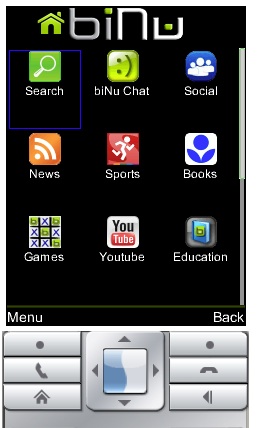While smartphones have changed the way many people in the US access Internet-based services, "dumb" cell phones remain the dominant way that most people in the developing world (such as Africa) get access to Internet and cloud-based services. Many of those phones can run Java applications and browse the Web (or at least websites based on the Wireless Application Protocol), but they don’t have the power or bandwidth to support the kind of "apps" that Android and Apple iOS users are accustomed to.

The biNu home screen, running in a Java mobile phone emulator.
An Australian startup called biNu is aiming to change that by putting mobile apps in the cloud, and giving the users of cheap, dumb cell phones access to them through a local Java client. BiNu (named for the letters on phone keypads for 2, 4, 6, and 8) provides access to Facebook, Twitter, and Google search and translation, RSS news feeds, and a host of other Web-based applications localized into 16 languages (including Swahili, Arabic, Chinese and Hindi) through an Amazon-hosted virtual app. The company already has users in Africa, Malaysia, and Iran, as well as in the US, and claims to have had over 4.2 million unique users and 33 million user sessions this month.
The local Java app, which the company claims will run on "almost any phone," runs like any other mobile Java app and requires little in the way of local processing power. Users can download the application using a WAP browser or via SMS message. The client only handles the presentation of the data, painting the handset's screen with display information sent over a proprietary wireless data protocol—the actual graphics rendering work, as well as the computational power and Internet connectivity required for the apps to run within biNu, are run on a virtual application server in the Amazon cloud.
Anyone can build biNu applications using biNu's XML schema and host them on their own servers. Since all of the data processing happens on the server, biNu offers a great deal more security for mobile phone users—a big concern, especially in countries where SMS traffic and other data transiting wireless networks may not be very secure. And unlike most thin client computing platforms, biNu's wireless protocol is asynchronous—making it usable over 2G networks without significant lag and allowing the client to recover from dropped sessions more easily.
Read on Ars Technica | Comments
DIGITAL JUICE
No comments:
Post a Comment
Thank's!